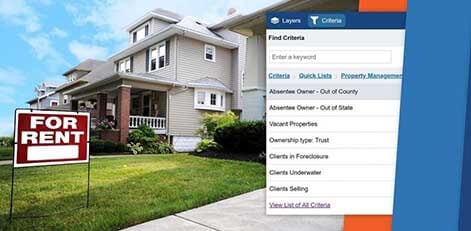5 Ways To Find And Contact The Owner Of A Property

PRO ALERT: If you're a real estate professional wanting to grow your business and you need to find owners of properties at scale, then you’re in the right place.
If you ONLY want to run a quick search to find a property owner for 1 or 2 properties, then you’re better off using Spokeo or PeopleFinder.
So you’re a real estate professional! Awesome. Let's get started, shall we?
Maybe you're a real estate investor and you want to find the owner of a vacant house (hopefully an absentee owner)? Or you’re a Realtor® and you want to get ahold of the owner of an off-market house your client loves. Or maybe, you’re a roofer, a solar panel installer, or another home services professional who sees an opportunity to offer your services to the owner of a home.
|
|
Whatever your reason for a property owner search, you’re likely in need of consistent, high-quality leads to market your services to. Finding the owner of a property is just one piece of the marketing puzzle.
As a professional, you know firsthand it’s a waste of time and money to blanket a neighborhood with marketing materials, treating every household as a potential lead. You’ve got your favorite channels on HOW to reach your best leads that typically convert. The issue is more about WHO to target with your marketing to ensure you’re communicating with the right prospects. Hopefully, at the right time and in numerous channels.
The Internet has become a treasure trove of lead information. It just takes some elbow grease on Google and researching on suspicious skip tracing sites that may or may not have malware, right?
Yes, you’re laughing because the pros know better.
In this post, we’ll start with a few ways you can conduct a property owner lookup to find the owner of a property at no cost. If you only need contact info for one or two properties, these free methods are best suited for you.
After these free services, we’ll cover PAID services you can use to obtain mailing lists that have a property owner's name, phone number, and potentially other information to better determine if the properties you’re targeting are worth pursuing - PROs, these paid services are for you!
We’ll even share one extra layer of data most of your competitors aren’t using, giving you the ability to create hyperlocal mailing lists tailored to your best prospects so you can reach them more often instead of blowing your entire marketing budget on a generic farm list.
You know the saying: “When you market to everyone, you market to no one.”
Find Property Owners Using Public Records
We'll skip the part about telling you to dumpster dive for public records on the interwebs. We want to make sure you spend time reaching potential customers, not with IT support trying to get your computer unhacked.
All methods discussed here for finding property owners rely on public records searches. Public records are just that (records) of marriages, births, divorces, deaths, and property purchases. County Recorders are entrusted with upholding and protecting this essential public service. Great public records ensure transparency and accessibility. These nonconfidential pieces of information can also be a goldmine for businesses that know how to access and use them wisely.
While all of the methods utilize public records searches, they don’t all have the same ease of use. Government sites can be challenging to navigate and they don’t provide easy exporting for contact information. They also might not be able to provide mailing addresses for absentee owners.
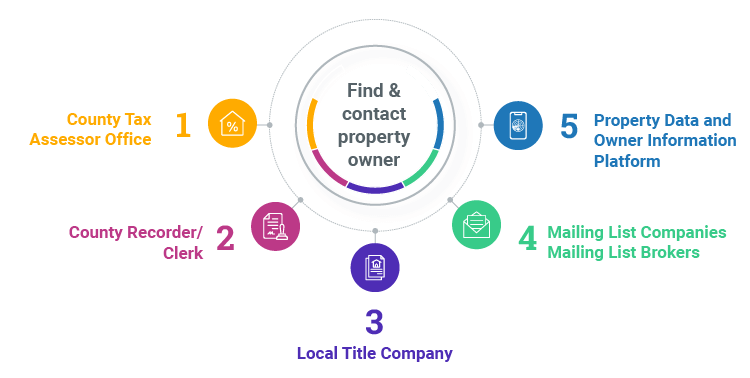
Let’s take a look at the five methods for searching public records to find the owner of a property and other public records information:
1. County Tax Assessor Office
If someone owns a property, you can be sure they're paying taxes on it and that the county tax assessor will have their information on record. To easily find the website, type into Google 'county assessor' plus the county you're interested in. You can even add 'property owner' to your search and you might get lucky enough to find the exact page you need without navigating a complicated government website. Otherwise, you might have to do a little searching (or a lot) to get to the right page to find property owners.
Finding a property is a lot easier if you have the property's identification number. Depending on your state and county, they will reference this number in different ways. It may be called the Accessor's Identification Number (AIN), Accessor's Property Number (APN), Section-Township-Range-Area-Block-Lot (STRABL), or Section, Township, Range, Area, and Parcel Number (STRAP). With 3,144 counties in the US, expect lots of variation. Just know this is the number that will appear on a property tax bill.
- Pros: This information is free.
- Cons: If you're operating in numerous counties, this can be a tedious process and there is zero consistency between county websites and the technology they employ. You are limited to basic property details, owner name, and mailing address listed where the tax bill is sent. You must create your own systems to organize and track leads. And there's no ability to refine lists, visualize insights, or automatically update this stagnant list when conditions on the property change.
Pro Insights – Visit the Public Records Online Directory, NETROnline. This free site provides links to your local county's Assessor, Treasurer / Tax Collector, and Recorder offices so you can search for the property and find this number. These government-run websites will allow you to search for properties by the accessor's number, property address, and names of the owner.
Running a property owner search to find an owner's name and mailing address, the County Tax Collector site will typically provide that information. You'll also see if the property tax bill is current which can come in handy. You'll also get to see if there are any special assessments associated with the property. As an example, Property Assessed Clean Energy (PACE) financing is a loan that owners can take out to make energy-efficient upgrades to their property. Unlike a typical loan, these loan amounts are attached to the property taxes and the rates are typically far higher than standard mortgage rates and are senior to existing loans. Even if the owner that took out the loan sells the property, this loan stays on the property tax roll.
2. County Recorder/Clerk
You can find a property owner by visiting the County Recorder as well. Using NETROnline, simply identify the state and county and the site will connect you to the appropriate site. But, if you're simply needing owner name and mailing address, stick with your County Tax Accessor. It's far easier to navigate and free.
Think of your County Recorder office as the place to go for documents associated with property and the people associated with a specific property. Documents recorded at the Recorder's office associated with people include things like death, births, bankruptcies, and divorce. Recorded documents associated with real estate include notice of sale, mechanics liens, bill of sale, deeds of trust, mortgages, easements, tax liens, homestead, reconveyance, and trust deeds. Another treasure trove of information for those with the patience, time, and strategy that require this huge library of information.
- Pros: A property owner search itself is free, most documents will cost and it will vary greatly depending on the county.
- Cons: If you're operating in numerous counties, this can be a tedious and expensive process. There is zero consistency between county websites. Many counties offer free search and shopping cart functionality to purchase documents you're looking to obtain but you'll be unable to try before you buy. Depending on the documents you are looking for, there will also be limited information outside of name, property address, and mailing address of owner. You must create your own systems to organize and track leads. And there's no ability to refine lists, visualize insights, or automatically update this stagnant list when conditions on the property change.
Pro Insights – Researching for this article took HOURS because we wanted to test a few county websites for search functionality and cost. Technology and search functionality are incredibly painful and limited. Some counties will force you to buy a full set of documents while others will allow you to process your request for specific pages of a document. Depending on the document type you're chasing, fees can vary greatly. Some investors use public records because they specialize in very specific niches like probate and bankruptcies. These pros are chasing deals fewer players tackle because it is so time-consuming and you're thumbing through mind-numbing legal documents.
|
|
3. Local Title Company
You call up your favorite local title rep and ask for a general FARM (Focused Real Estate Marketing) list. Some of the basic fields for the search included name, address, mailing address, property characteristics, nearby neighbors, comparable sales, transaction history, and some states have community information like demographics and school information.
Most FARM marketing lists don't run amock of Regulation X of the Real Estate Settlement Procedures Act (RESPA). This federal law prohibits entities subject to RESPA rules (including licensed Realtors, mortgage brokers, appraisers, and title companies) from receiving a "thing of value" for referring business to another settlement service provider regulated under RESPA. General lists for information available in the public records domain won't cause issues. However, custom lists are another story. Rules will vary by state and provider but expect a title company to charge for custom reports and marketing lists where you're seeking information beyond what you'd find at the County Recorder's office.
- Pros: Some of these real estate lead lists will be free of charge. For custom reporting where you are charged, title reps are far more familiar with searching the information you need saving you a tremendous amount of time and money. Since they are hoping to gain your business, they won't typically charge much outside of what it costs to actually pay for the information. Having a savvy title company may also help inform you of ways to refine your search that you didn't even know about.
- Cons: Title reps are busy pros themselves and can't always drop everything to work on your list. You'll also receive a static list that starts to age as soon as it's pulled. This means you'll need to come back often for updated lists. It's more money, but at least the title rep is helping you save time by not doing it yourself. Tracking these lists, however, becomes its own issue. Like other free and low-cost options, you'll have to create your own systems to organize and track leads. And there's no ability to refine lists, visualize insights, or automatically update this stagnant list when conditions on the property change.
Pro Insights: One of the things real estate professionals need to understand is that title reps get hit up a lot by amateurs that constantly ask them for marketing lists that never turn into title business. Don't be that person. Respect their time as title reps are an extremely important piece of your team.
More title companies are developing custom applications for serious clients to do research on their own. This is critically important for foreclosure investors that need more updated information and access to research. As an example, First American has a mobile and web-based application that allows their customers nationwide to research property characteristics, tax information, order documents, and also see transaction history on the property. An investor would most likely need to be a customer to gain access. However, most will still call their title rep before they bid verifying they are investing in a first lien position, no liens have appeared, and no IRS liens exist. There are no second chances are courthouse steps. These apps are more aimed at a property-by-property research approach but are still incredibly valuable.
 4. Mailing List Companies and Mailing List Brokers
4. Mailing List Companies and Mailing List Brokers
Marketing list companies and marketing list brokers have grown in sophistication over the years. These services allow you to call up and speak with a list broker that seeks to understand who you are trying to target, what information is needed, and then they go about creating your custom mailing list. Unlike the free options mentioned above, most list brokers now have the ability to obtain email and append phone data. Lists can be created based on property characteristics, neighborhood details, and demographic data on owners.
- Pros: General mailing list brokers will have some ability to append email and phone numbers to your lists. This is typically a fast and easy process.
- Cons: Data quality is the biggest issue with list brokers. Data sources are coming from different providers and some will be updated more than others. These lists can get very expensive and there is nothing more frustrating than purchasing a list that is years out of date. Tracking these lists will be an issue. Oftentimes, you'll only have one year to use a list before the list provider requires you to pay for the list again. Like other free and low-cost options, you'll have to create your own systems to organize and track leads. There's still no ability to further refine lists without cost, visualize insights, or automatically update this stagnant list when conditions on the property change.
 Pro Insights: This is a text message our VP of Market Insights, Aaron Norris, received in July. The text is referring to a rental he had sold more than two years previously.
Pro Insights: This is a text message our VP of Market Insights, Aaron Norris, received in July. The text is referring to a rental he had sold more than two years previously.
Even more embarrassing? The property had sold again three months earlier, meaning the list provider had data over two years old.
By the time you're spending money on lists, it's clear you're probably needing to expand your technical abilities to stay organized. Be it customer relationship management software, sales software, or Google sheets, tracking starts to become critical as you are being forced to manage static mailing lists and lead progress.
The goal in refining marketing lists is to be able to follow up consistently with quality leads. You save money on large general marketing lists so you can hit your target prospect multiple times. The pros know it's all about consistency and follow-up.
 5. Advanced Property Data and Owner Information Platform
5. Advanced Property Data and Owner Information Platform
If you're a property-centric business that relies on consistent, high-quality leads to keep your sales pipeline full, advanced property data and owner information software is a must-have tool. It isn't only Realtors, mortgage, and real estate investors that use this type of software service. Home and property services greatly benefit from access to constantly updated records as well as the advanced functionality that these platforms offer.
Pros:
- Nationwide property owner lookups
- Ability to mix and match property, mortgage, owner, demographic data, and more to create hyperlocal mailing lists whenever you like
- Explore leads and refine marketing lists based on visual cues and insights
- More advanced capabilities include links to social media profiles, built-in skip tracing, emails & phone numbers for appending
- Mobile app with GPS functionality, ability to add notes, images, files
- Mailing lists that auto-update themselves with new leads (set-it & forget-it prospecting)
- Robust integration and automation functionality
Cons:
- These platforms are not free – usually subscription-based with additional charges for specific record types like documents, emails, and phone numbers.
- Not for beginners. These platforms take time to explore and get used to the vast amount of data that’s available.
- Advanced features like integrations and automation capabilities can be intimidating. Sometimes requires 3rd party support.
Pro Insights – Main Street real estate and home services professionals are quickly learning having access to Wall Street-style data and tools is a must to stay competitive. It's far more affordable than it's ever been and it allows the pros to focus more on what they do best.
PropertyRadar often says our ideal client is someone that has a CRM system, and they need help filling it with leads. PropertyRadar accomplishes that by letting you build unlimited mailing lists using an industry-leading 200+ filtering criteria to target your best customer profile(s). And you can give each dynamic mailing list superpowers to connect with property owners before your competition does - more on that in a minute.
|
|
How to find property owners and contact information like a pro with PropertyRadar
PropertyRadar gives you many options to discover exactly what you're looking for or find off-market properties you didn't even know you should be interested in. You can use the property owner lookup to find the owner or if you have the owner's name and want to find the various properties they own, you can conduct a property owner search by their name.
To find the owner of a property, simply enter the address of the property into the search bar.
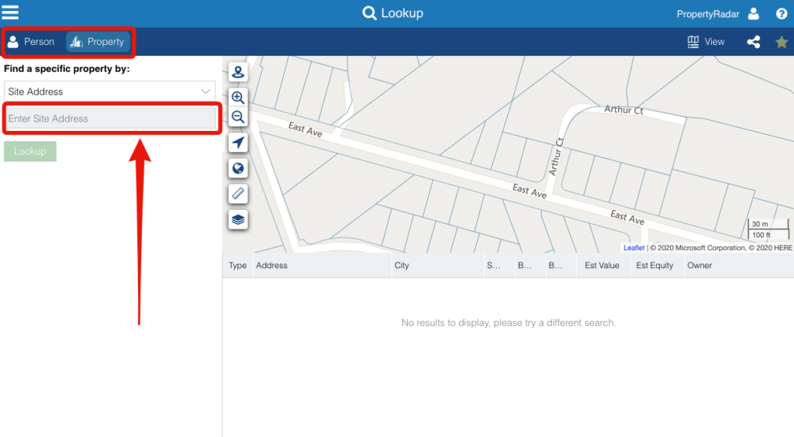
You'll notice, as shown below, that as you type the address the search bar will autofill with the address you're looking for.
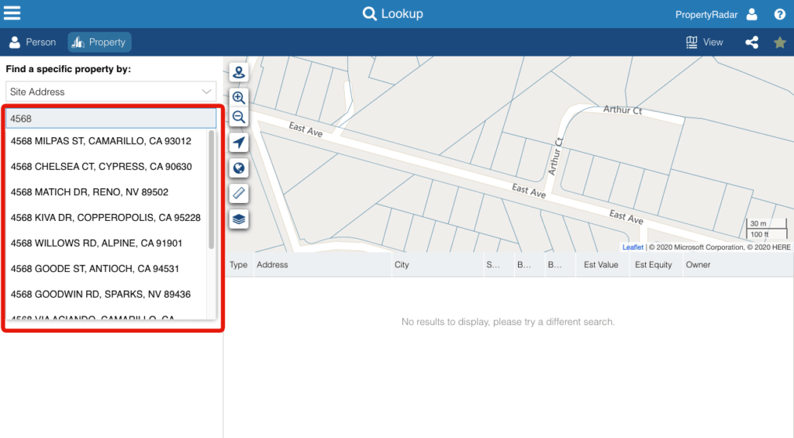
Once you click the address in the dropdown, a split view pops up showing the location of the property on a map along with some pertinent details about the property below the map. Here you can get an immediate view of the property's location in the neighborhood along with a few important details about the property such as square footage, number of bedrooms and bathrooms, the owner-occupied status, and of course the reason you're searching to begin with – the name of the property owner.
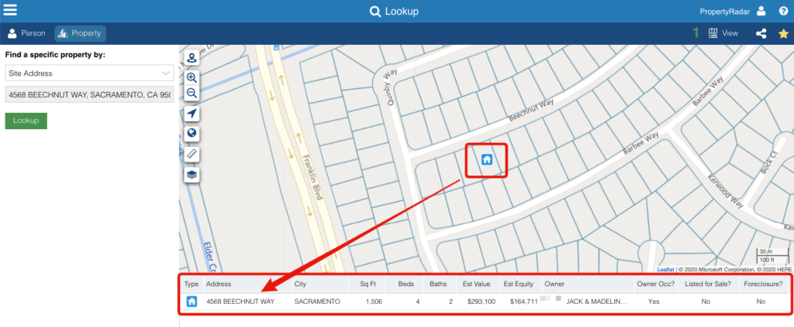
Now click on the address bar below the map to get the important contact information you're seeking along with other critical insights into the property itself.
As a professional, you know that having as much information about the owner and the property as you can get is vital to setting up a successful marketing campaign.
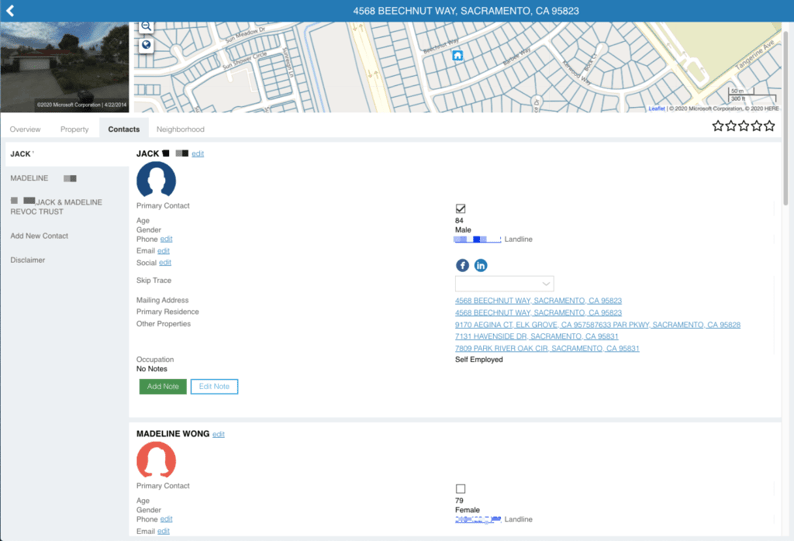
Under the Contacts tab, you'll find important contact information like:
- Owner's full name
- Age
- Gender
- Phone numbers
- Email addresses
- Mailing address (landlords' and 2nd homeowners' actual address)
- Primary residence address
- Other properties they may own
Unlike some services, skip tracing is automatic, and built-in for you. And you have the ability to add and edit notes directly into the Contact profile.
If you find the owner of the property is an LLC, click here to see how quick and easy it is to find out who the owner of the LLC is. Then come back here to finish your research.
Property profile details
Aside from contact information, other properties owned, and everything else described above, you'll have access to property details that will help you make smart, informed business decisions.
You will find critical property information like:
Transaction & Title History
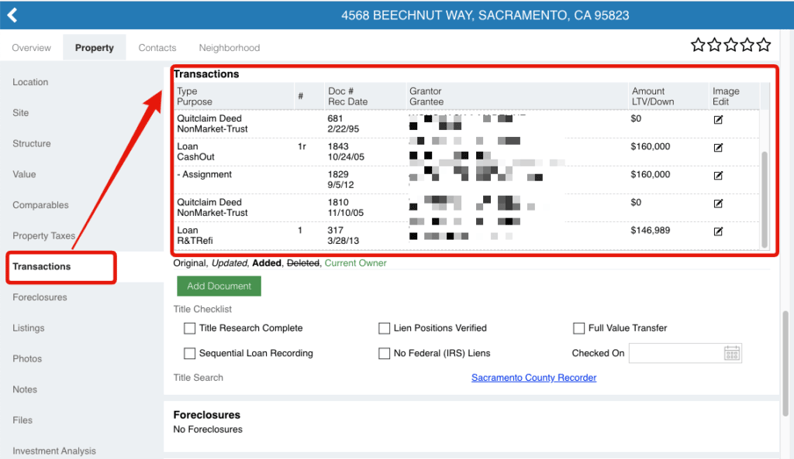
Comparables
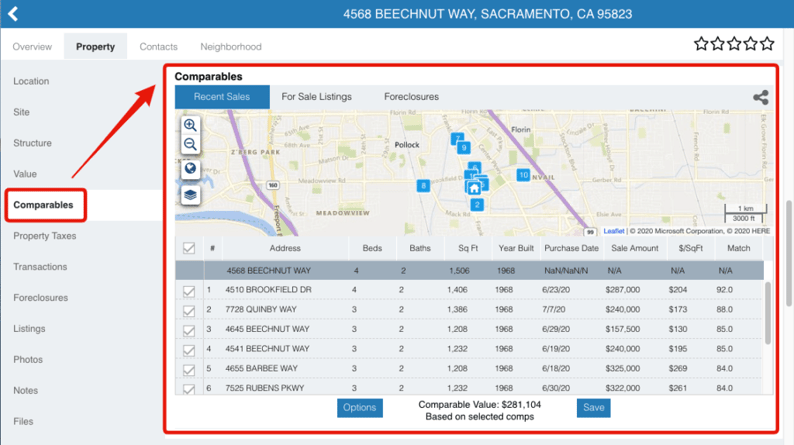
Ability to Add Photos, Notes, Files, and Run Investment Analysis
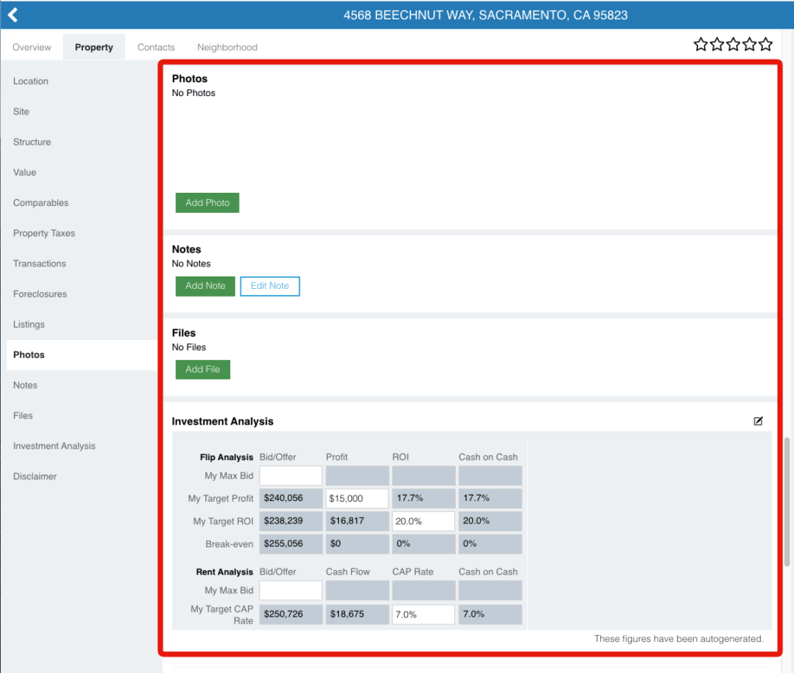
Other Important Property Data and Owner Information You'll Find Here:
- Outstanding loan balance and type of loan
- Loan history
- Estimated property value
- Equity
- Year built
- Number of rooms and bathrooms
- Square footage
- Lot size
- Number of units on the property
- Presence or absence of pool
- Presence or absence of garage
- Property taxes
- Zoning and school district information
Watch our short video on finding & using owner info & property details...
Getting the most out of property owner information
In addition to contact information, the property profiles offer the information you need to make an informed decision on whether you want to contact this owner, and what you might say.
For example, if you’re a real estate investor, you might use a different pitch to communicate with someone who owns their home free and clear versus someone who’s underwater on it. You can use this information to increase the likelihood of success with cold calling, door knocking, and direct mail marketing.
You might use this information to decide who to contact, and to prioritize your prospects. Maybe for an absentee owner who owns 5 other properties that aren’t in your area all as a trustee, you might assume that they don’t make the best candidate for your property management services. But if they own two or three properties in your area under their name, then they could be a landlord who’s ready to outsource property management.
Reaching out to property owners
Now that you’ve found the owner of the property and their contact information, what do you do next? How can you improve your success with direct marketing?
- Follow up, follow up, follow up - One outbound message simply isn’t enough. The most successful property-centric businesses are excellent at follow-up. You’ll lose to competitors who just don’t quit. Automating your outreach (described below) can make this easier to achieve.
- Track your progress - You also need to be tracking your progress with individual prospects. Inside of PropertyRadar, you can do this using custom lead statuses. Using our Zapier integration, you can send all of your PropertyRadar leads into your CRM and track them using your processes. With our Zapier integration, we seamlessly connect with popular CRMs like Pipedrive, Zoho, LionDesk, and many others.
- Use automation - Automating your direct mail and other forms of marketing is absolutely essential. Otherwise, you’re at the mercy of getting too busy to market your business to property owners. To win, you need to build highly targeted mailing lists of prospects inside of PropertyRadar.
- Mailing Lists with Superpowers - Each dynamic monitored mailing list created in PropertyRadar can 1) automatically update itself (& your CRM, power dialer, or another productivity tool) with new leads, 2) automatically trigger multi-touch marketing campaigns or send a single-piece mailer, 3) alert you about these new leads via push notifications or emails. You’ll be contacting the owners you discover before your competitors even know they exist.
- Take a multichannel approach - Your follow-up shouldn’t be all in one channel, meaning you shouldn’t only send postcards or only cold call. The best direct marketing campaigns reach out to target audiences across channels. With our PRINTGenie integration, you can use their multichannel outreach templates to reach out to targeted lists of leads. For example, you can contact absentee owners whose primary residence is out of state and who have a certain amount of equity in their home. You can send them a letter, then an email, then a text message, and then another postcard. Check out our automation guide and webinar for more details.
Finding the owner of a property isn’t enough. You need to win with consistent follow-up and automated outreach to come out ahead of your competitors.
Key takeaways on finding property owners & their contact info
The method you use to run a property owner search to find the owner of a property will largely depend on your purpose and goal.
- Going the free, government website route is always a great option if you only need a name or two. But if you need more than a handful of names, this can be a tedious, painstaking process.
- Reaching out to your local title company is another free or low-cost option. But data is limited, you need to rely on the title rep's availability, and you need to organize and track your lists.
- Marketing list companies and list brokers can be a fast, easy way to get lists. But your lists data can be outdated the second you buy them, often require additional costs for continued access to the lists, and the cost for such lists can get very costly and there's nothing worse than paying for old, inaccurate information.
- Using a property and owner information platform is definitely the pros' choice. With a platform like PropertyRadar, you have the ability to mix and match property, mortgage, and demographic data to create hyperlocal marketing lists whenever you'd like is something the low-cost and free methods don't offer. You can explore leads and refine marketing lists based on visualized insights. Other advanced capabilities include social media links, skip tracing links, rich historic transaction data, emails, and phone appending, GPS functionality, property and people notes, dynamic lists, demographics details, and advanced automation functionality.
Professionals who need to scale their local business, understand that direct mail has a critically important role in helping them do that. Check out this post that small business owners like yourself also find very helpful, How To Use Direct Mail Like The Pros To Boost Your ROI.
|
|



